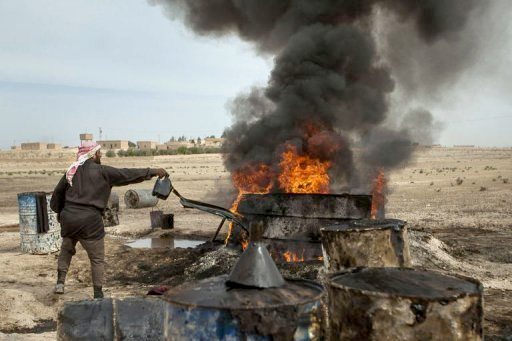
I noticed a few weeks ago that the price of gasoline had dropped fairly suddenly by about 8%-10%, although it has risen again since.
Today I noticed this story from ANSAmed, which reports an even larger level of oil revenue for the Islamic State than had previously been estimated:
Islamic State Makes 3-6 Mln Dollars Per Day From Oil Revenue
Jihadists control about 11 wells
(ANSAmed) — Beirut — Eleven oil wells in Iraq and Syria are believed to bring in over three million dollars per day to Islamic State (IS) coffers.
Israeli intelligence sources claim that the amount may be higher, as much as six million dollars per day. This is the reason behind the US airstrikes Wednesday evening on oil installations in the Deir Az-Zor province, eastern Syria. The ‘Islamic Caliphate’ proclaimed by Abu Bakr Al-Baghdadi uses the funds — which make it the largest terrorist economic powerhouse ever — to stock up on weapons, pay its fighters well and buy off local Sunni tribes. IS controls four of the five main oil fields in Deir Az-Zor, the region with the most energy resources in Syria.
By selling oil at sharply reduced prices, say several sources in Syria, IS has been able to secure the support of armed tribal clans in both Deir Az-Zor and Raqqa, the only Syrian province entirely in its hands. In the Himrin region of Iraq’s Diyala province (near the Iranian border) alone, IS is thought to be earning 600,000 dollars per day, the mayor of a city in the region, Oday Al-Khadran, stated in recent days. Khadran said that the jihadists fill about 100 tankers of oil per day and deliver it “to ruthless retailers in Mosul or Syria. Here it is sold to foreign mediators at some 4,000 dollars for each tanker, some 80% less than market prices in Europe”.
The smugglers are then believed take it in several different directions — to Turkey, Iraq or Syria — but the end destinations are unknown.
Since number-crunching is one of my hobbies, I decided to take these figures apart…
First, I assumed the level of ISIS’ revenue to be in the mid-range of the Israeli figures, say $4.5 million per day.
The price of light crude has been hovering at about $100 per barrel (although it has dropped below that recently).
Therefore, if ISIS is selling crude oil at an 80% discount, the “mediators” who take delivery in Mosul or Syria are paying roughly $20 per barrel.
Now we look at global oil production.
Rounding off the International Energy Agency’s figures for 2011, approximately 90 million barrels of oil are produced every day.
Therefore we may assume that ISIS is selling approximately $4.5 million ÷ $20 = 225,000 barrels per day. That represents about .0025 of 90 million daily barrels, or one quarter of one percent. Not very much.
However, the market for any global commodity, including that for crude oil, may be significantly affected by even a slight fluctuation in producer price. I’m a rank amateur in these matters — I know next to nothing about the international oil trade. However, the following points seem fairly obvious:
| 1. | The middlemen who trade in the global market for oil are relatively indifferent to such trivial issues as the ethics of buying and selling “blood oil” produced by ISIS. | |
| 2. | These middlemen can make an enormous profit on crude produced by the Islamic State, even if they sell it significantly below the market rate. | |
| 3. | The market price of crude oil is sensitive at the margin to producer prices. | |
| 4. | Various players in the oil game will either regard lower prices as a boon to be desired, or as a bane to be avoided, depending on their status as producers or consumers. |
The United States and its handful of allies have just started bombing ISIS’ refineries in Syria.
I don’t know enough to determine whether:
| A. | The USA dislikes the effect that ISIS production has on prices, and wants to reduce their production; | |
| B. | The possible lowering of prices is desirable, so the air strikes are only cosmetic and do not significantly impede production; or | |
| C. | The USA really does want to cut off the flow of money to the Islamic State, and is conducting the latest attacks for exactly that end. |
As I mentioned earlier, I am too ignorant concerning the oil market to guess what is going on behind the scenes. I’ll leave it open to knowledgeable readers to offer a more informed opinion.

Hat tip: Insubria.

where are the global mosque reports?
Finally, the story behind the air strikes! So, it’s follow the oil money. I see. Well, now you have me curious. Just who is buying all this black market oil?
Friends and neighbours – TURKEY….
Another thing to factor into gas prices is that its nearing the end of summer, so vacationers are back to work and demand has come down a bit, which is probably a more likely driver of the reduction in oil prices. Happens most every year around this time once driving slacks off a bit and demand goes down.